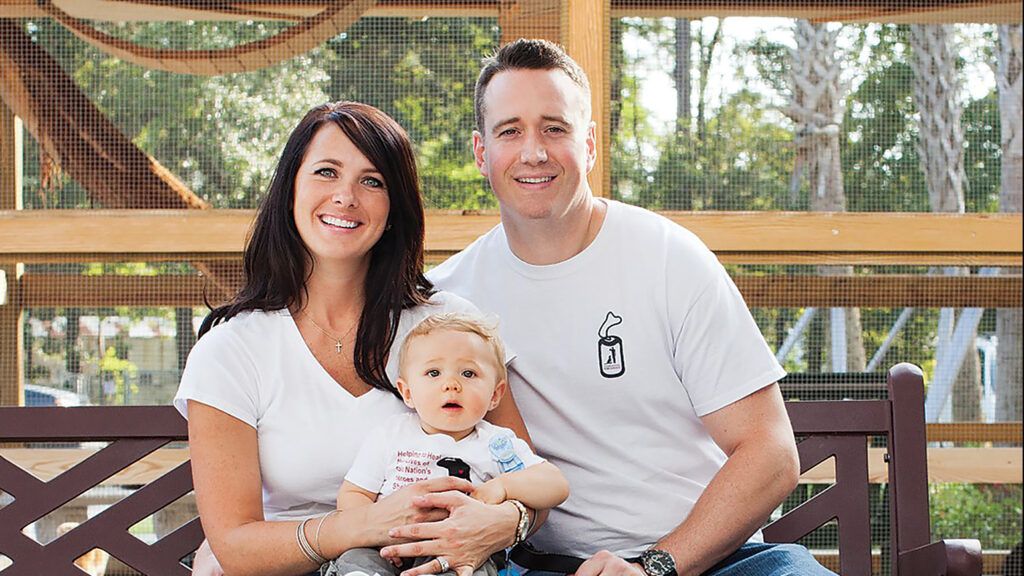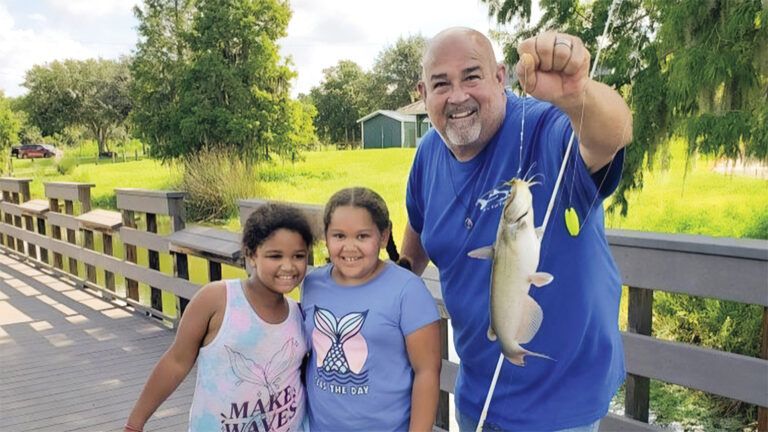David Sharpe was enjoying a quiet evening at home in 2009, his dog Cheyenne curled up on his lap, when he turned on the television and saw something that would change his life.
It was a news segment about how dogs were improving the lives of physically disabled veterans. The segment reminded him of how crucial his mixed pit bull had been in his own life.
“Cheyenne saved me,” Sharpe says. “I don’t have any missing limbs, but something was wrong and she saved me.”
When Sharpe joined the Air Force in 1999, he became a sixth generation vet. He served in the Air Force security forces and was deployed to Saudi Arabia and Pakistan. When Sharpe was 21, two friends in his unit died by suicide. One was married and had a small child. Sharpe found himself in a downward spiral he didn’t know how to stop.
“I was really upset,” Sharpe says. “I blamed God for allowing [him] to take his own life when he had a kid and a wife. Why didn’t God just take me? At the time, I didn’t think I had anything to live for.”
Sharpe, who was still serving in the Air Force, masked his pain the only way he knew how. He drank heavily and picked fights at bars. He struggled with depression and anxiety attacks and couldn’t see a way out of his pain.
“I was doing whatever it took to mask my condition,” Sharpe says. He wasn’t diagnosed at the time, but in hindsight recognizes he was manifesting symptoms of Post-Traumatic Stress Disorder (PTSD).
Things began to change for Sharpe when he accompanied a friend who was looking to adopt a dog to a pit bull rescue. There was one dog, a two-month-old brown-and-white pit bull who didn’t give Sharpe the time of day.
“I love a challenge,” Sharpe says. “I wanted to choose the one who was least interested in me and [get] her to love me.” He adopted the rescue dog and named her Cheyenne.
Cheyenne was a calming presence. When he had dreams of his time deployed in Saudi Arabia and woke in a panic, Cheyenne was there for him to talk to and hug. Nevertheless, Sharpe still struggled. A few months later, in a drunken depression, he took drastic action.
“I took a .45 pistol and put it in my mouth,” Sharpe says. “I started squeezing the trigger and in walked Cheyenne. She walked right up to me and started licking the tears off my face.”
Sharpe put the gun down on his lap. Cheyenne laid down on his hands, covering the gun.
A month later, in another depressive state, Sharpe finished a bottle of liquor and went to his bedroom to get the gun. This time he locked the door so Cheyenne couldn’t stop him.
“She threw herself against the door and busted through,” Sharpe says. “I took the pistol out of my mouth. I still remember the metallic taste of the barrel. Cheyenne sat down on my lap and gave me this look like, ‘What are you doing? You know better than this.’ God gave me an angel and it was her.”
It was this scene—Cheyenne saving him from his darkest moments—that came to Sharpe’s mind when he saw that news segment in 2009. His experience had taught him that dogs weren’t just helpful for physical disabilities. He was alive because of his dog.
An idea began percolating in Sharpe’s mind. What if he could create a program that paired rescue dogs with veterans? Did such a program exist? Were other veterans in need of this service? His first step was research. “I did a lot of research on the internet,” Sharpe says. “Then I met with a dog therapy expert from Walter Reed to establish if there was a need for this kind of program.”
Representatives from Walter Reed National Military Medical Center told Sharpe that the type of program he envisioned was exactly what veterans needed. They saw many veterans without physical maladies who were in obvious need of help, but most of their programs were focused on improving physical health. At the time, Walter Reed didn’t have a PTSD ward. Mental health often fell by the wayside.
Walter Reed gave Sharpe the opportunity to speak at their facility. Sharpe shared his story, opening up about his struggle with anxiety, depression and alcohol abuse, and how Cheyenne had helped him.
“Afterward, any veterans who were interested could sign up,” Sharpe says. “I picked them up after work and took them to shelters all over the D.C. area.”
Sharpe continued to work eight to 10 hours a day at his job in the office of the Director of National Intelligence. He spent his off-hours driving vets around D.C. and coordinating with shelters. It was a far cry from how he used to spend his free time—drinking with his buddies.
After speaking at Walter Reed, Sharpe developed a partnership with the Department of Veterans Affairs (VA). “I told my story at the VA in D.C.,” Sharpe says. “I told them, ‘I know what it’s like. You don’t know how to talk about it. You feel embarrassed. Well, who better to talk to than a dog? They won’t talk back.’ ”
Half of the veterans who attended his first speech at the VA signed up to get dogs.
As Sharpe continued to help veterans adopt rescue dogs, expenses began to add up. Sharpe spent all of his savings, around $2,500, on the program. It cost $750 to apply for 501c3 nonprofit status. Then there were legal fees, paying for brochure materials and hiring an accountant to look over the books.
Six months in, the program—which Sharpe eventually named Companions for Heroes—had grown to the point where Sharpe needed outside help turning his passion into a full-fledged business. “No one had taught me how to start a charity or grow a company,” Sharpe says. “It was all heart and determination.”
Sharpe’s first step in finding help was the same as his first step starting a nonprofit: research. He did an internet search and found the Institute for Veterans and Military Families (IVMF). He took the Entrepreneurship Bootcamp for Veterans course. IVMF taught Sharpe the difference between a lean business plan—a one-page summary for quick pitches—and an in-depth business plan, which could be hundreds of pages. They worked with him on selecting board members, building long-term goals and structuring his business.
“I wish I’d known how to target social media advertisements when I was starting out,” Sharpe says. He was connected to marketing experts at Syracuse University who helped him create a targeted $50 ad that resulted in 300 new “likes” to the Companions for Heroes Facebook page in just one week.
Nine years later, Companions For Heroes has helped pair over 1,000 shelter pets with veterans. The organization pays adoption fees, provides gift cards for pet food and supplies, and pays for training.
Sharpe quit his day job and dedicated himself to running his company.
Another realization led him to create a separate organization to help veterans. A VA study found that approximately 20 veterans die by suicide every day. “The VA doesn’t have a lot of vets or staff to handle everyone in the system,” Sharpe says. “And 14 of the 20 who commit suicide every day are not receiving services from the VA.”
Sharpe worked to develop a peer-to-peer system for struggling veterans, and in 2016, he returned to IVMF to learn how to run a new for-profit veteran-to-veteran counseling business.
“We build a recovery plan for them,” Sharpe says. “We’re vets helping vets.”
IVMF helped Sharpe structure his business.
“They provided a business attorney to look over our operation plan,” Sharpe says. “They’ve literally saved me thousands of dollars in startup costs.”
Sharpe now splits his time between both companies. Cheyenne passed away in 2015, but her legacy, and the assistance of organizations like those mentioned here, have helped Sharpe to become a successful business owner twice over.
“[Running a business] helped me see that I wasn’t the only one who was lost,” Sharpe says. “It helped me see that saving an animal’s life can also save a wounded warrior’s life.”
If you or someone you know is considering suicide, please contact the National Suicide Prevention Lifeline at 1-800-273-TALK (8255) or go to suicidepreventionlifeline.org.






